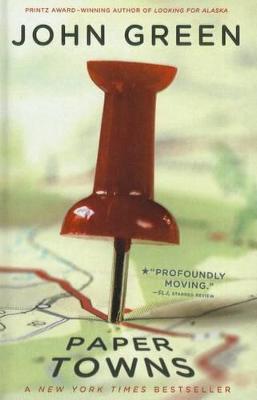Reviewed by Amber (The Literary Phoenix) on
After a while and a few re-reads, John Green’s characters start to blend together. There are elements to Margo that remind me of Alaska, and all of Green’s moody male teen protagonists start to sound like pining, boring lumps after a while. Sometimes, I’m okay with that, though. While the characters sound similar, Green’s skill at creating an adventure out of so many ordinary elements is delightful. I keep rereading his books because they make me smile, and they interest me. I can’t quite say I was rooting for Q in this one, but I was enjoying his search.
John Green’s style in Paper Towns retains the same ring as his other books. In a role reversal from An Abundance of Katherines, we have a hopeful protagonist and two doubtful yet supportive best friends. We have a car trip into the great unknown. We have unlikely relationships and the reminder people are more complicated than just the molds we fit them into.
The “unsatisfying ending” does tend to frustrate people. Green doesn’t play into romantic hearts or allow that sense of satisfaction from a job well done. I’m strange in that I really enjoy endings like the one we get here – not everything is happily ever after, but at least there’s closure. It’s a soft reminder that not everything is picture perfect and that life is messy and we make choices and take risks and things may or may not work out… but we do what we must because we are alive and we may not have another chance.
I like that. John Green uses that theme a lot – the feeling of taking chances and having ordinary adventures.
There’s a good amount of immediate action in Paper Towns, including dead bodies, hijinks, and breaking and entering. It fills most of the first 30% of the book. After that, there’s a lull. You keep waiting for an aha! moment and it takes its sweet time rolling along. In that way, the pacing can feel a bit sluggish after the initial adventure, and I can see this book losing readers in its middle section.
One criticism in his writing: the r-word is used a lot, the slur for the differently-abled. If it was written now, John Green would have made a different choice I’m not defending the choice, but I know back in 2008 it was part of the vernacular to say something is “stupid”. It’s jarring to hear and an unfortunate decision that has aged poorly in our more attuned future. I don’t believe it is worth skipping the book over, but to many it will be a harmful word to read, so I wanted to mention it. I think highly of John Green in general, and I personally do not believe him to have intended any hurt or pain from his choice of language – indeed, I find it more to be a reflection of “the way kids talk these days”. It was, unfortunately, an accurate and unforgivable depiction of teen language when the book was released, and John Green has apologized for it since.
Still, I enjoy Paper Towns. It’s one of Green’s under-appreciated novels, and that’s a shame, because it still contains elements people loved in Looking for Alaska. I guess it just depends on what sort of adventure you’re looking for, and this one appeals to me. If you enjoy his other works and you can forgive his unfortunate use of language, this is a good one.
______________________
Original Review (2010): 5 stars
Reading updates
- Started reading
- 12 December, 2010: Finished reading
- 12 December, 2010: Reviewed
- Started reading
- Finished reading
- 12 December, 2010: Reviewed
